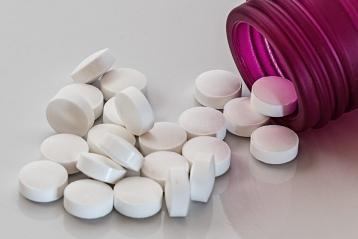Taking an aspirin daily can benefit those with a genetic risk for bowel and colon cancers.*
“Every 21 seconds someone in America is diagnosed with cancer,”
Jesse Slome, director of the American Association of Critical Illness Insurance
Daily-aspirin-reduces-cancer, June 12, 2020: British researchers report that a daily aspirin reduces the risk of inherited bowel cancer. Plus the benefits of taking aspirin last at least 10 years after stopping treatment.
Researchers at the Universities of Newcastle and Leeds published their findings in The Lancet today. The study focused on patients with Lynch syndrome. It revealed that taking two aspirins a day, for an average of two and a half years, reduced the rate of bowel cancer by half.
The study involved 861 patients with Lynch syndrome. The generic problem affects about one in 200 people in the population. A DNA repair issue makes these individuals at much higher risk of cancers such as bowel and womb.
“Two aspirins a day for a couple of years gives protection that lasts more than 10 years,” stated Sir John Burn, Newcastle University and Newcastle Hospitals NHS Foundation Trust. Burn led the research. “For people at high cancer risk, the benefits are clear — aspirin works. Our new international trial, CaPP3, will see if smaller doses work just as well.”
Daily aspirin reduces cancer risk; colon cancer by up to 50% reduction
Their findings revealed additional data when all original recruits were included in the study. Those on aspirin had 42% fewer colon cancers. Among those who took the aspirin for a full two years, there were 50% fewer colon cancers.
The researchers also looked at cancers of the endometrium or womb. Those taking aspirin had an overall reduced risk of cancer of 24%. Those who took aspirin for the full two years had a 37% reduced risk.
“Before anyone begins to take aspirin on a regular basis they should consult their doctor,” stated Burn as part of their interview. “Aspirin is known to bring with it a risk of stomach complaints, including ulcers and bleeding. However, if there is a strong family history of cancer then people may want to weigh the cost and health benefits of taking aspirin for at least two years.”
Cancer planning should include some supplemental health insurance planning
“Every 21 seconds someone in America is diagnosed with cancer,” shares Slome. “Today’s health insurance policies do not always cover all expenses. Most people will miss also paychecks as they take time off from work to undergo treatments.” A modest cancer insurance policy can cost less than $100 a year. “Consider it a highly affordable way to supplement the gaps in your health insurance,” Slome concludes.

* Source. Science Daily, June 11, 2020
Photo Source: Image by Steve Buissinne from Pixabay
Follow great health news updates
Find the latest health news related to cancer, heart attacks and strokes. Follow the Association’s Facebook page. Click here to access and subscribe.


